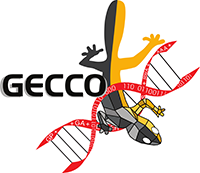Evolving Collective Behaviors in Robotics2nd ECBR Workshop, GECCO 2017July 15th-19th, 2017 - Berlin, Germany
Organizers: Nicolas Bredeche (UPMC), Evert Haasdijk (VUA), Heiko Hamann (U. Paderborn), Abraham Prieto (U. Coruña) Contact: evocobots@isir.upmc.fr Web: http://evocobots.isir.upmc.fr DescriptionThis workshop will bring together researchers interested in the automatic design of coordinated behaviors in decentralized collective systems, putting the emphasis on evolutionary robotics techniques. The goal of this workshop is to provide an updated perspective of this field, both from a theoretical and practical perspective, and to consider different areas of applicability for such techniques including design for engineering and modeling for biology.This workshop encourages collaboration between researchers already present at GECCO, or in other similar venues such as the Artificial Life conferences, which are not always present at the same conference. As for GECCO, this workshop is of particular relevance to participants of the Complex System track. As long as the evolutionary aspect is emphasize, keywords describing the topic are:
Workshop agendaWorkshop duration will be two hours (i.e. one slot).
When/where?July 15th or 16th 2017, during GECCO 2017, the Genetic and Evolutionary Computation Conference, Berlin, Germany.Important datesSubmission deadline: March 31st, 2017Authors notification: April 7th, 2017 Camera-ready submission: April 21st, 2017 Paper SubmissionWe accept papers of two types:
Bio of the organizersNicolas Bredeche is Professeur des Universités at Université Pierre et Marie Curie and is a researcher at the Institut des Systèmes Intelligents et de Robotique (ISIR, UMR CNRS 7222). His research activity focus on adaptive collective systems both to understand natural systems and to design automated methods for artificial systems. Notably, he was previously involved in the FP7 EU Symbrion project (2008-2013) and he is currently involved in the EU H2020 DREAM project (2015-2018). He is author of more than 45 papers in journals and major conferences in the field. He has (or currently is) advisor or co-advisor of six PhD students in machine learning, evolutionary robotics and individual-based modelling for biology. He has served in program committees and/or as track chair of the major conferences in the field of Evolutionary Computation (incl. GECCO track chair for the Artificial Life and Robotics track 2012/2013). He is also a member of the french Evolution Artificielle association and he has organized several international workshops in Evolution, Robotics, and Development of Artificial Neural Networks as well as giving tutorials on the collective aspects in evolutionary robotics. Check homepage.Evert Haasdijk is assistant professor in the Computational Intelligence group at VU. He has been with the computational intelligence group at VU since 2008, researching on-line evolution in robots. Before that, he was research assistant at Tilburg University, researching social learning in populations of software agents. Dr Haasdijk has ample experience in evolutionary computation, stretching back to the successful PAPAGENA project in 1992, where he participated as an industry partner. He has served as member of program committees of well-established conferences in the field of evolutionary computation (CEC, GECCO), was local chair for GECCO 2013 and (co-)organised various workshops and track such as the EvoROBOT track at EvoSTAR conferences and the International Workshop on the Evolution of Physical Systems at ECAL and ALIFE conferences. Dr Haasdijk was guest editor for the Special Issue on Evolutionary Robotics of the Evolutionary Intelligence journal and invited speaker at the PPSN XIII Workshop on Nature-Inspired Techniques for Robotics. Check homepage. Heiko Hamann is Professor for Swarm Robotics at the University of Paderborn (Germany). His research is focused on Evolutionary Robotics, Swarm Intelligence, and Swarm Robotics. Within Evolutionary Robotics he worked on evolvable controllers for modular robotics, onboard evolution with robots in hardware, and evolution of swarm behaviors by minimizing surprise. He is coordinating the European FET H2020 project "flora robotica" that investigates how robots and natural plants can collaborate and form a mixed society. Part of the project is work on Evolutionary Robotics, for example, the evolution of controllers for robots that steer the growth and motion of natural plants. He has published over 70 peer-reviewed papers in journals and conferences and was program committee member for several conferences in the field of Evolutionary Computation (e.g., GECCO, Alife, EvoStar). Check homepage. Abraham Prieto Garcia is an Associate Professor at the University of A Coruña, Spain. He is a member of the Integrated Group for Engineering Research (GII) of the same university and leads the Collective Systems Section within the GII. He graduated in 2002 and obtained his Master Degree in 2004 in Industrial Engineering. In 2009 he obtained a Magna Cum Laude for his PhD Thesis in the field of optimization techniques for distributed problems in engineering. He started his collaboration with the GII in 2004 developing projects related with Intelligent Processing of images and signals and with the optimization of distributed systems. In 2005 he became Assistant Professor and then in 2010 he gained the Associate Professor position. Regarding his research work he is author of several papers in journals, international conferences and book chapters. He has participated in numerous national and regional research projects from public calls, many of them in collaboration with private companies. His research covers the following fields: bio-inspired techniques for distributed problems, evolutionary robotics and image and signal intelligent processing. |